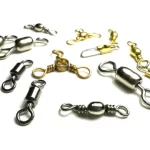The line rips off the reel, and just when victory seems near, the fight suddenly ends. A lifeless weight remains — evidence of a brutal underwater theft. The taxman, that notorious underwater predator, has struck again.
While Ernest Hemingway’s old-school tactics involved using firearms to fend off sharks, today’s anglers face a different challenge. From muskie and bull trout to barracudas and blacktip sharks, numerous predators lurk below, ready to snatch an easy meal. Fortunately, there are strategies to help outsmart these underwater foes and keep a hard-earned catch intact.

Reacting Quickly: Reel and Retreat
According to renowned fisherman and TV host Carter Andrews, predators instinctively target struggling fish. Stressed fish emit distinct vibrations that larger predators can detect. When a catch begins exhibiting erratic, left-to-right movements, it’s often a sign that a predator is closing in.
If the water erupts in splashes or the line suddenly surges, it could indicate the presence of a shark, barracuda, or other large predator. In these moments, cranking the reel with speed and determination becomes crucial. Using heavier tackle can provide the extra strength needed to pull a fish in before a predator makes its move.
However, when the situation seems hopeless, Andrews recommends a more unconventional approach. Opening the reel’s bail or cutting the line allows the fish a chance to escape. While this may seem counterintuitive, it can increase the fish’s survival odds by removing the tension that makes it an easy target.
Knowing When to Relocate
Much like grizzly bears scavenging for leftovers, ocean predators often linger near fishing boats, anticipating an easy meal. Andrews notes that sharks sometimes associate the sound of an engine slowing down with the arrival of potential prey. After one successful ambush, other predators may join the frenzy, further reducing any chance of landing a catch.
In such cases, leaving the area may be the wisest decision. Although it’s difficult to abandon a productive fishing spot, it often prevents further losses. Moving to a quieter location can help avoid unwanted predatory attention.
Using Technology to Your Advantage
Recent advancements offer anglers additional ways to deter predators. Sharkbanz, for instance, markets an electromagnetic device that emits a magnetic field capable of disorienting sharks. Similar to how a sudden bright light can disorient human eyes, the device’s magnetic field overwhelms the shark’s sensory organs, prompting it to retreat. Many anglers report success using these devices to fend off unwanted encounters.
Military research has also explored shark deterrents. After the devastating sinking of the USS Indianapolis, where hundreds of sailors faced relentless shark attacks, the U.S. military sought to develop a reliable defense. Various chemical substances, including a formula called “Shark Chaser,” were tested in hopes of preventing future tragedies. While the results were largely ineffective, they marked the beginning of ongoing efforts to better understand and manage predator interactions.
Modern sonar systems can also serve as a useful tool. By monitoring nearby fish activity, sonar units provide real-time data on the movements of potential predators. Keeping an eye on the screen can offer anglers an opportunity to adjust their approach before a predator makes its move.
Respecting the Natural Order
With conservation efforts on the rise, the populations of sharks, barracudas, and muskies have made notable recoveries. Many regions enforce strict regulations against finning and promote catch-and-release practices to ensure the health of aquatic ecosystems. As predators play a critical role in maintaining ecological balance, coexisting with them becomes essential.
Rather than seeing predators solely as foes, some anglers even embrace the challenge of targeting these powerful species. Pursuing toothy fish like pike, muskie, or even sharks on purpose can offer a thrilling experience. Plus, learning to understand and respect these predators adds another layer of appreciation for the sport.
Ultimately, the best defense against the taxman is a combination of quick thinking, strategic use of technology, and a respectful approach to nature. With these tools in hand, anglers stand a far better chance of keeping their prized catch safe from the jaws of opportunistic predators.
Image/Source: MeatEater





